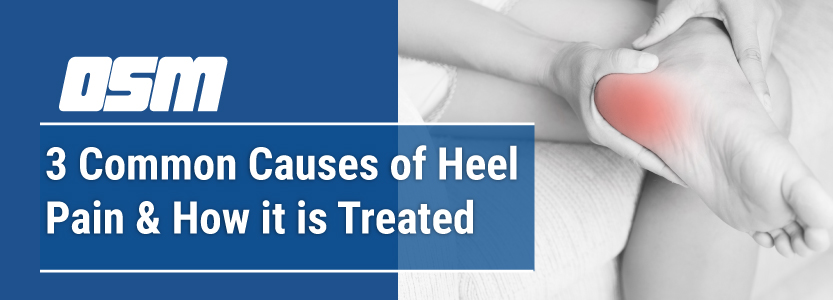3 Common Causes of Heel Pain & How it is Treated
Article featured on NY Orthopedics
Heel pain is one of the most common complaints of patients with foot and ankle disorders — but what causes heel pain, exactly? The pain often occurs at the back surface of the heel and can limit any standing, walking, or running activities. Explore our guide to the common causes of heel pain to learn how a foot and ankle specialist can get you back on your feet in no time.
Why Does My Heel Hurt?
Heel pain is not typically caused by a single injury, like a twist or fall, but from repetitive stress and pounding of the heel. Common heel pain causes include:
- Plantar fasciitis. Too much running or jumping can inflame the fascia (tissue band) that connects the heel bone to the base of the toes. The pain, centered under your heel, may be mild at first but flares up when you take your first steps in the morning. Muscle cramps in the calf may also occur if the Achilles tendon tightens as well. If plantar fasciitis is left untreated, it may lead to heel spurs.
- Stress fracture. This is often linked to repetitive stress to the bone over a short period of time, especially in young athletes who alter their training regimen suddenly. This may include more sprints, increased mileage while running, or increased training intensity. Stress fractures can also be caused by osteoporosis.
- Achilles tendonitis. Achilles tendonitis occurs when the tendon that attaches to the calf muscles to the heel becomes inflamed or painful due to overuse. Any activity that requires pushing off — like basketball or running — can result in tendonitis.
How Can Heel Pain Be Treated?
Treatment for heel pain varies depending on the severity of the injury and your health goals. Your foot and ankle specialist may first suggest some home remedies — like rest, applying ice to the heel, and over-the-counter pain medications — to ease your symptoms. If your heel pain doesn’t get better within a few weeks, you should make an appointment with your doctor so that they can provide you with the appropriate treatment.
Your doctor may prescribe physical therapy in most cases. This can help strengthen the tendons and muscles in your foot, helping to prevent further injury. If your pain is severe, your foot and ankle specialist may provide you with anti-inflammatory medications that can be injected into the foot or taken orally. They may also recommend that you support your foot as much as possible — either by using orthotics or taping the foot.
In very rare cases, your foot and ankle specialist may recommend surgery to correct the problem.
The Orthopedic & Sports Medicine Center of Oregon is an award-winning, board-certified orthopedic group located in downtown Portland Oregon. We utilize both surgical and nonsurgical means to treat musculoskeletal trauma, spine diseases, foot and ankle conditions, sports injuries, degenerative diseases, infections, tumors and congenital disorders.
Our mission is to return our patients back to pain-free mobility and full strength as quickly and painlessly as possible using both surgical and non-surgical orthopedic procedures.
Our expert physicians provide leading-edge, comprehensive care in the diagnosis and treatment of orthopedic conditions, including total joint replacement and sports medicine. We apply the latest state-of-the-art techniques in order to return our patients to their active lifestyle.
If you’re looking for compassionate, expert orthopedic and podiatric surgeons in Portland Oregon, contact OSM today.
Phone:
Address
17355 Lower Boones Ferry Rd Suite 100A
Lake Oswego, OR 97035
Hours
Monday–Friday
8:00am – 4:30pm



